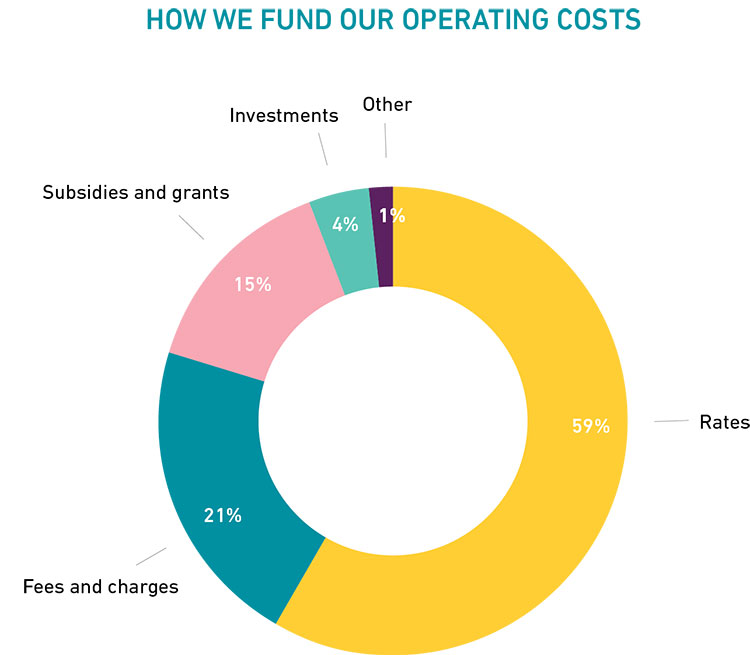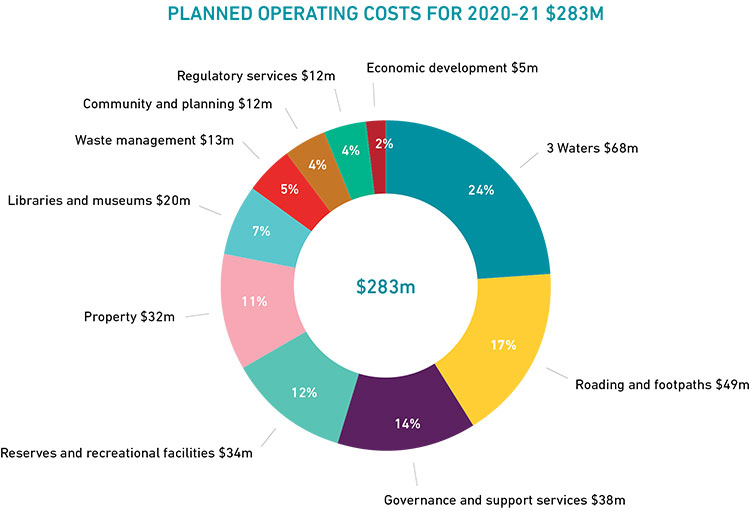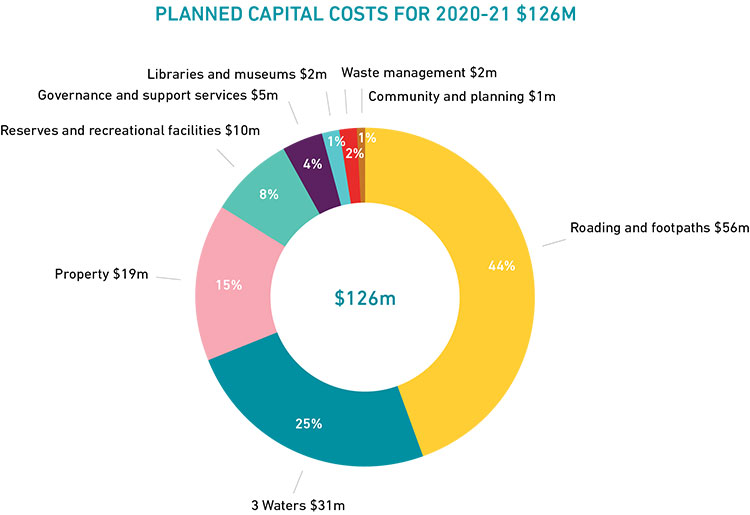Consultation information
Supporting documents and information from the consultation - please contact us of you want any of the documents or information used for our consultation.
-
Checking in on our plans for the future (September 2020 pre-engagement)
A heads up – checking in on our plans for the future | He whakatonu - titiro ana ki ngā mahere āmua
Challenges ahead | Ngā wero āmua
We’re putting together our plans and budgets for the next 10 years and we want to know what’s important to you. A lot has happened since we talked with you three years ago about long term plans for the city’s future.
We were already facing some big challenges and making plans at this time is difficult, given there is so much uncertainty.
Not only are we dealing with the longer term impact of COVID-19, we have challenges around things like responding to climate change and the planned water reforms.
We think we need to keep doing what we’re doing – investing in our city, e.g. renewing pipes and roads and upgrading playgrounds, and planning for the future. If we continue to invest, we’ll be improving the city and helping its economic recovery through spending and jobs.
But this comes at a cost. If we do the things we said we would, such as replacing and improving water pipes, making things safer and link better, and lifting the look and feel of the city this takes a lot of money and has to be paid for mainly through rates, fees and charges, and/or debt.
We’re already forecasting rates rises and more debt over the next few years and that’s before we look at other new things, such as possibly bringing in a better kerbside rubbish and recycling system.
At this stage, our main focus for the next 10 years is keeping our key assets, such as pipes, roads, pools, parks and buildings, working well. We must also plan for challenges such as climate change, as well as continuing all our day-to-day work, such as issuing building consents, responding to noise complaints and checking food premises.
We also need to plan for Dunedin to grow. The city’s population growth is projected to be relatively resilient in the near future, despite COVID-19. People want to live and work in Dunedin and we’re expecting about 800 people on average to move here each year. A big part of planning for growth will be addressing our housing shortage and how we encourage development.
Touching base | He whakapānga
We’re doing a quick check in with you now, but we’ll be talking with you in much more detail next year as we develop our 10 year plan for 2021-31. This includes our formal consultation on the draft plan, likely to be in March-April next year.
Some of the things we do | Ētahi o ā mātou mahi
3 Waters – water and wastewater treatment plants, reservoirs, pipes and pumping stations.
Roading and footpaths – roads, footpaths, cycleways, traffic and street lights and street cleaning.
Reserves and recreational facilities – parks, swimming pools, sportsgrounds, the Dunedin Botanic Garden, cemeteries and public toilets.
Property – social housing, community centres and halls, and managing the properties we own.
Libraries and museums – libraries, Toitū Otago Settlers Museum, Dunedin Public Art Gallery, Olveston and City of Literature.
Waste management – kerbside rubbish and recycling collections and landfills.
Regulatory services – building consents and inspections, dog registration, noise control, parking operations and alcohol licensing.
Community and planning – the District Plan, resource consents, grants and events.
Economic development – business advice, city marketing, i-Site visitor information and economic development.
Governance and support services – customer enquiries, communications, finance, human resources, policy, administration, Councillors and community boards, and IT.
Work we’ve done recently
A lot of the money we get is spent looking after what we have to make sure the city is working properly. Over the past two years we have spent about $194 million on:
- replacing old water, wastewater and stormwater pipes, mains and sewers
- resealing roads and footpaths, kerb and channel work and maintaining bridges and retaining walls
- maintaining public facilities such as playgrounds, swimming pools, gardens and toilets
- spending on our properties, such as our community housing flats.
Some other things we’ve done:
- We’ve finished refurbishment work on the Ross Creek Reservoir dam. This is part of a bigger project to make the city’s water supply more secure.
- The new artificial turf playing fields at Logan Park opened last year. This was a joint project between the DCC, Football South and other community organisations.
- In 2019-20, we allocated more than $2.5 million in grants to community, arts and environmental projects, and events.
- Seismic strengthening in the Edgar Centre has finished and the building is no longer considered earthquake prone.
- In each of the past two years we spent close to $1 million on new books and other collection items for our libraries.
- We’ve upgraded a range of jetties and pontoons across the wider city.
Work underway
- The Council created a $950,000 support fund to help local businesses and households affected by COVID-19. We’ll continue to help our community deal with this crisis.
- We’re installing LED streetlights across the city. Switching to LEDs saves on energy and maintenance costs.
- The ‘Our Coast Our Community: St Clair-St Kilda Coastal Plan’ project was launched in March 2020, which sees the DCC working with mana whenua and the community to create a vision and long-term plan for the area.
- We’re making good progress on the Peninsula Connection – the project to widen and raise the low road around the Peninsula to make it safer and more attractive. The Vauxhall to Macandrew Bay section is finished and work has started on the Company Bay to Broad Bay section.
- We’ve started talking with the community about how well our playgrounds and skateparks are working for people and what we should be providing in the future.
Work coming up
We’re still going to be investing in pipes and roads, but we also have some other big projects on the horizon.
- Construction of the new Mosgiel Pool is due to begin mid-2021.
- The community co-design process for the South Dunedin Library and Community Complex is well underway. Funding for construction will be discussed as part of the 10 year plan process.
- We’re planning to improve how stormwater is collected and moved around South Dunedin to help reduce the flooding that can damage homes and businesses. There’s been a lot happening in terms of research and planning and we’ll be starting work on data gathering, monitoring and investigation in coming months.
- We’re aiming to become a net carbon zero city by 2030, which means significantly reducing Dunedin’s carbon emissions. We are doing this by identifying and focusing on the most important emissions sources, forming new city-wide partnerships to help address these.
- We’re reviewing our strategies to ensure they still meet the community’s expectations and reflect new legislation, the current challenges our city faces and our commitment to sustainability and the Treaty of Waitangi.
We’re also looking at including new projects, such as bringing in a better kerbside rubbish and recycling service, and progressing a new landfill at Smooth Hill.
-
The financial picture (September 2020 pre-engagement)
Where does your money go?
The DCC gets its money from a range of sources – about 60% from rates, with the rest from fees and charges, subsidies, grants and property rentals, some money from Council-owned companies, investments and debt.
The 10 year plan gives us the chance to sort out what work we want to do and how we pay for it. At this stage, there is a lot of pressure on DCC budgets. Much of this is because we have to fix or replace assets that are wearing out, such as water and wastewater pipes and buildings we own.
It’s difficult to juggle the income we have with all the things the community wants. We will need to decide whether to increase rates further, put up fees and charges, borrow more, cut costs or delay/not do some projects. It’s expected we’ll have to do a combination of all these things.
How do we pay for things?
In general, our running costs, such as paying staff, heating libraries and mowing sportsgrounds, are paid for through rates and fees and charges. We usually use debt to pay for capital projects, which include building new things like a swimming pool or library.

How we fund our operating costs Rates 58.5% Fees and charges 21.3% Subsidies and grants 14.6% Investments 4.2% Other 1.4% 
Planned operating costs for 2020-21 (shown in millions) 3 Waters $68 24% Roading and footpaths $49 17% Governance and support services $38 14% Reserves and recreational facilities $34 12% Property $32 11% Libraries and museums $20 7% Waste management $13 5% Community and planning $12 4% Regulatory services $12 4% Economic development $5 2% TOTAL $283M 
Planned capital costs for 2020-21 (shown in millions) 3 Waters $31 Roading and footpaths $56 Property $19 Reserves and recreational facilities $10 Governance and support services $5 Libraries and museums $2 Waste management $2 Community and planning $1 TOTAL $126M Rates
If you own property then you pay rates. The level of rates set by the Council depends mainly on the services we have to provide, such as drinking water and roads, and on what services and facilities the community wants.
Debt
At the moment, the DCC has set a debt limit of $350 million. Our current debt is sitting at around $266 million. It’s expected to increase to $309 million during this financial year because we’re doing more work. The debt limit will be reviewed as part of the 10 year plan. We could lift our debt limit so we can borrow more. Borrowing spreads the load across generations – some people think this is fair, some don’t.
Investments
While the DCC has some debt, this is offset by the fact it also owns a lot of assets. We hold a range of investments, including Council-owned companies, investment properties and the Waipori Fund.

